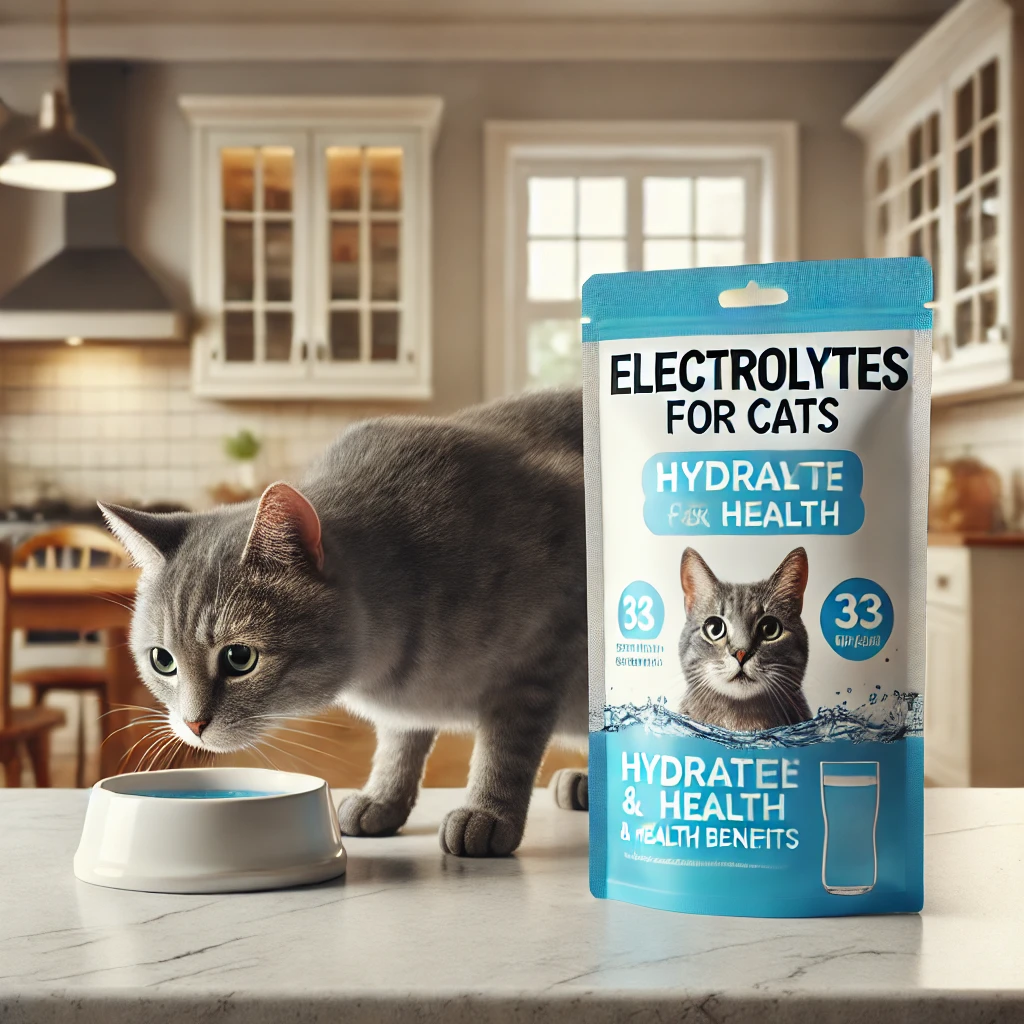Keeping our feline friends healthy and hydrated is one of the most critical aspects of pet care. Dehydration is a common issue in cats, especially as they are notoriously poor water drinkers. Electrolytes for cats play a crucial role in maintaining proper hydration, as they are involved in balancing fluids within their bodies. Understanding how electrolytes work and how to prevent dehydration in cats is essential for ensuring their overall well-being.
In this post, we’ll explore what electrolytes are, how they work, signs of dehydration, and practical tips for keeping your cat hydrated—whether through electrolyte supplements or choosing the best dry cat food that promotes hydration.
What Are Electrolytes and Why Are They Important for Cats?
Electrolytes are essential minerals that carry an electric charge and play vital roles in many physiological processes. In cats, essential electrolytes include sodium, potassium, chloride, calcium, and magnesium. These minerals help maintain fluid balance, support nerve and muscle function, and regulate blood pressure. They are essential in preventing dehydration because they help retain and distribute water throughout the body.
When a cat is dehydrated, it may experience an imbalance in these crucial minerals, leading to a range of health issues such as kidney problems, lethargy, and digestive issues.
How Electrolytes Help Prevent Dehydration in Cats
Dehydration occurs when a cat loses more water and electrolytes than it takes in. This can be due to factors such as illness, excessive heat, or simply not drinking enough water. Electrolytes for cats help replenish the minerals lost during these times, allowing the body to restore balance and maintain proper hydration levels.
The Process of Hydration and Electrolytes
When a cat drinks water, electrolytes play a critical role in helping cells absorb and retain that water. Sodium, in particular, helps the body hold onto fluids, while potassium ensures that water and nutrients can enter and exit cells effectively. Chloride assists in maintaining proper pH levels in the blood, while magnesium and calcium contribute to muscle function and energy production, which can be affected by dehydration.
Recognizing the Signs of Dehydration in Cats
It’s essential to monitor your cat for signs of dehydration, especially if they’re showing unusual behavior. Here are some common symptoms of dehydration in cats:
- Lethargy: A dehydrated cat may appear unusually tired or listless.
- Sunken Eyes: If your cat’s eyes appear dull or sunken, this could indicate dehydration.
- Dry Gums: Gums that are dry, sticky, or pale can be a sign of fluid imbalance.
- Poor Skin Elasticity: You can check for dehydration by gently pulling the skin at the back of your cat’s neck. If it doesn’t snap back quickly, your cat may be dehydrated.
- Loss of Appetite: Dehydrated cats may be less interested in food, particularly dry cat food.
Practical Tips for Preventing Dehydration in Cats
Cats can be notoriously bad at drinking water, which is why it’s essential to take steps to prevent dehydration before it becomes a serious issue. Here are some helpful tips to ensure your cat stays hydrated and maintains a proper electrolyte balance:
1. Ensure Constant Access to Fresh Water
The easiest way to prevent dehydration is by providing fresh water at all times. Cats are more likely to drink water that is clean, cool, and refreshed daily. Consider investing in a water fountain to encourage more water consumption, as some cats prefer running water to stagnant bowls.
2. Incorporate Wet Cat Food into Their Diet
While the best dry cat food options are convenient and often beneficial for dental health, wet cat food contains a high moisture content that can help prevent dehydration. A balance between wet and dry food can provide the benefits of both, while also keeping your cat more hydrated.
3. Use Electrolyte Supplements for Cats
If your cat is sick or recovering from illness, adding an electrolyte supplement can be extremely helpful. Electrolyte supplements for cats are available in powder or liquid form, and they can easily be mixed with food or water. These supplements help replenish essential minerals and promote healthy fluid balance.
4. Monitor Environmental Factors
Heat can increase the likelihood of dehydration, so it’s crucial to ensure your cat stays cool during warmer months. Keep your cat indoors, especially during peak heat times, and make sure they have access to water-rich foods or electrolyte supplements if they are at risk of losing fluids.
How the Best Dry Cat Food Can Support Hydration
While wet food offers hydration benefits, choosing the best dry cat food that includes balanced ingredients can also support overall health and hydration. High-quality dry food options often incorporate nutrient-dense formulas that can help maintain electrolyte balance and promote overall well-being.
For cats that primarily eat dry food, it’s important to ensure they are drinking enough water throughout the day. To encourage more water intake, you can:
- Place water bowls in multiple locations: Cats are more likely to drink when water is easily accessible.
- Try flavored water: Some cats may be tempted to drink more if you add a bit of tuna juice or chicken broth to their water.
When to Consider Electrolyte Supplements for Cats
While most cats can maintain healthy electrolyte levels through a balanced diet and regular water intake, certain circumstances may call for supplementation. If your cat is experiencing diarrhea, vomiting, or has recently undergone surgery, it might need extra support. In these cases, an electrolyte supplement designed for cats can help restore lost fluids and minerals more quickly.
Be sure to consult your veterinarian before giving your cat any supplements, as they can provide guidance on the proper dosage and type of electrolyte solution that’s best for your pet.
Conclusion: Prioritize Hydration and Electrolyte Balance for Cat Health
Preventing dehydration in cats is a key part of responsible pet ownership. Electrolytes for cats play an essential role in keeping your feline friend hydrated and healthy, especially during times of illness or stress. By monitoring your cat for signs of dehydration and incorporating strategies like wet food, electrolyte supplements, and fresh water, you can ensure your cat maintains a healthy balance of fluids and minerals.
Choosing the best dry cat food and offering it alongside other hydration-friendly options, like wet food or electrolyte-infused water, ensures that your cat receives all the essential nutrients needed for a happy, healthy life.
Whether through daily habits or during special circumstances, keeping an eye on your cat’s hydration and electrolyte levels can prevent more serious health issues down the road, ensuring that your cat stays active and well.



